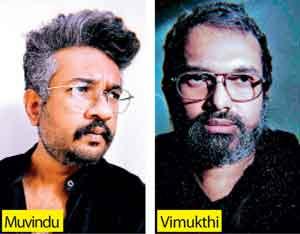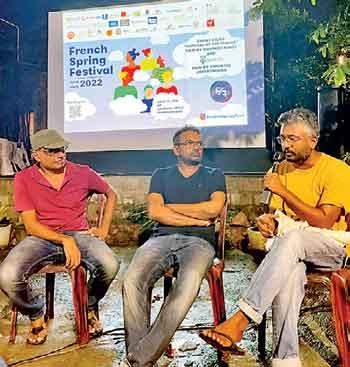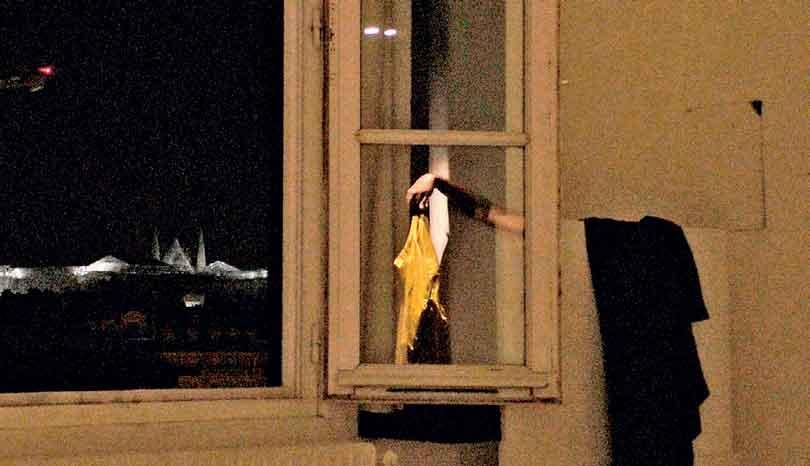MUVINDU BINOY AND VIMUKTHI JAYASUNDARA ON SCREENING THEIR WORK AT THE FRENCH FILM FESTIVAL 2022

 Two fantastic artists in their fields; award-winning film maker, writer and tv critic Vimukthi Jayasundara and multidisciplinary artist Muvindu Binoy collaboratively screened their individual short films at the French Spring Festival 2022. ‘Survival of the Fragile’ by Binoy and ‘Sankofa’ by Jayasundara are two films that share nothing in common yet finds its middle ground through their non-narrative style of storytelling.
Two fantastic artists in their fields; award-winning film maker, writer and tv critic Vimukthi Jayasundara and multidisciplinary artist Muvindu Binoy collaboratively screened their individual short films at the French Spring Festival 2022. ‘Survival of the Fragile’ by Binoy and ‘Sankofa’ by Jayasundara are two films that share nothing in common yet finds its middle ground through their non-narrative style of storytelling.
ABOUT THE ARTISTS
MUVINDU BINOY
 Muvindu Binoy is a multidisciplinary artist whose practice is focused predominantly on digital collage and film. As a digital artist, Binoy observes his personal outlook, exploring themes of gender, agency, title, and the expectation of traditional values contradicted by modern-emancipated standards of the digital age. Binoy works with subjects facing the Generation Y of his country, using the letter ‘Y’ as a pun for his questioning of character and integration of the reality experienced in his artistic outcome.
Muvindu Binoy is a multidisciplinary artist whose practice is focused predominantly on digital collage and film. As a digital artist, Binoy observes his personal outlook, exploring themes of gender, agency, title, and the expectation of traditional values contradicted by modern-emancipated standards of the digital age. Binoy works with subjects facing the Generation Y of his country, using the letter ‘Y’ as a pun for his questioning of character and integration of the reality experienced in his artistic outcome.
VIMUKTHI
JAYASUNDARA
Born in Ratnapura in southern Sri Lanka in 1977, he attended the Institute for Film and Television in Pune, India, from 1998 to 2001. After making The Land Of Silence, a documentary in black and white about the victims of the civil war which was selected for several festivals (Marseilles, Rotterdam, Berlin), Vimukthi Jayasundara studied in France at the Fresnoy School of Art before becoming a resident at the Cinéfondation of the Festival de Cannes in the e abandonnée, which was awarded the Camera d’Or at the Festival de Cannes 2005.
Speaking to both Binoy and Jayasundara in an interview, we talk about art, confronting the uncomfortable and the power of storytelling;
Q You both featured your films together at the French Spring Festival – tell us about the two films and collaborating?
Vimukthi: Sankofa is a new film I managed to finish just in time for the festival. Sankofa means to bring back something. When I go out, as a practice, if something catches my eye I start filming so I have a lot of random material to work with. I shot a short film some years back but I wasn’t happy with the outcome so I put it on the back burner till I found more material. When [they] reached out and asked me to show something for the Festival, it seemed ideal because I was already working on it. The screening went well, and we had a good turn up.
Muvindu: My short film has the same title as the exhibition I was also doing for the Festival – ‘Survival of the Fragile’. It’s a video collage where some scenes are staged, some are real and some are interviews and it’s a short without any direct narrative. I wanted to allow the viewer to figure out for themselves what scenes actually happened and which ones were staged.
I think it could be really frustrating if the idea that I had when I used that medium is not coming out as best as it could because I limited myself.
-MUVINDU-
Q The theme for this year’s FSF is ‘Recounting Histories’, engaging with the question of storytelling and how artistes use their medium to convey certain narratives. How does your work translate to the theme?
Muvindu: Film is a fantastic medium to tell stories...a bit expensive though! I think more than the medium itself, the idea I have is more powerful than the medium I choose to tell it or execute that idea. If I constantly push myself to make films only or just collages, I think it could be really frustrating if the idea that I had when I used that medium is not coming out as best as it could because I limited myself [to that medium].
Vimukthi: I think film is not to tell stories but rather to give a visual experience. Storytelling implies the audience hears something but my work is a completely non-narrative visual experience and I question anything that is trying to ‘tell’ a story to the audience. In my work, there is no neat beginning or end and I think it’s more profound in the sense where there are words involved, you immediately assign a meaning to it but with a visual it is up to you to interpret it.
Q In that sense Vimukthi, you’ve maintained that with your work, you don’t want to simply play for the gallery, you direct what you feel you should direct.
Vimukthi: Yes, and I think the Sri Lankan audience has already punished me for it! I love watching stories in cinema but when it comes to my work, I like to experiment and challenge myself. I want to have new experiences through my work, otherwise we will be stagnant and comfortable in what we’ve witnessed and understood. We are very lazy on challenging things on the mainstream and I wanted to see if I can bring something new. It’s not easy, suddenly you are being treated as an outcast and its not comfortable. But I enjoy doing what I do and so far, I’m successful, maybe not locally but internationally.
Q Is provocation what you aim for with your work? The need to provoke some kind of response, good or bad, from your audience?
Vimukthi: Yes and no. It’s not that I’m aiming for provocation, it just so happens that people react to my work like that. Sometimes I don’t even know why it provokes people but it happens. When I work on something, I work for myself I don’t really care the cost of it. It doesn’t matter to me how people take it as long as I’m doing something for myself as creative work.
Q Some years back, in an interview you mentioned that Sri Lanka doesn’t understand your work. Do you still feel the same, that the Sri Lankan audience is not ready to confront the uncomfortable truths?
Vimukthi: Yes, and I think it’s getting worse. At the time of the war, we were much more open, reflective and questioning – artistes were doing some very creative work and questioning what was going on. Now, I think in all fronts we’ve lost our aim and don’t know what we are doing. We don’t question the things that makes us uncomfortable. We hear other people’s opinions but we’ve already formed our own so everyone just stays in different corners of the same place doing nothing. When I released my first film, I had a lot of censorship and I fought with the government, the military and the censorship board but you look at it now, it’s still the same! Every generation continues to have the same fight but nothing changes.
Q Interestingly Muvindu, your work also explores how generations approach and respond to change. Do you feel the same – are we uncomfortable with pushing the boundary?
Muvindu: I agree with Vimukthi. We are more closed up than before. It’s not just Gen Y but even Gen Z and Gen Alpha who grew up with access to technology will slip into the comfort zone than push the boundaries. You look at experimental films, I still wonder why many people don’t try to go beyond the usual and try to make the palette more colourful.
It’s complicated. When you have work that reach international audiences but you still have local battles that are so silly because you are fighting to show something that’s been done and dusted 500 years ago like a kiss scene or something slightly taboo,
it’s difficult..
-VIMUKTHI-
 Q But art and film has very little obligation to be politically correct than other mediums. Doesn’t film and the arts owe it to its form to maintain its authenticity to provoke and portray the uncomfortable?
Q But art and film has very little obligation to be politically correct than other mediums. Doesn’t film and the arts owe it to its form to maintain its authenticity to provoke and portray the uncomfortable?
Muvindu: Honestly, we are uncomfortable with a lot of things. There are people who are not happy to see nudity on screen and it’s 2022! Whoever wants to dive into ‘controversy’ has to continue to push that boundary to make any change. I think right now is a very good time to do that. Even though it can be risky, it’s worth the risk.
Vimukthi: It’s complicated. When you have work that reach international audiences but you still have local battles that are that so silly because you are fighting to show something that’s been done and dusted 500 years ago like a kiss scene or something slightly taboo, it’s difficult. As an artist, I look for what I need to please myself with my work, I’m comfortable with my own expression and I’m happy with what I’ve questioned through my work. But it’s complicated to question and appease at the same time. I don’t work for an audience but you DO have an audience. You can’t easily forget that.
Q Muvindu, your work Protest in Colour and Survival of the Fragile is an important take on what’s happening in the country right now. Speaking of art being politically correct, how do you make your work speak without too much controversy?
Muvindu: “Protest in colour” series is my attempt of immortalizing the protesters and the protests. I simply wanted to replicate the classic renaissance aesthetic with contemporary protest images. Most found via news articles and photojournalism. It’s a collaboration of AI Art and digital manipulation. I have no premeditated intention of NOT making anything too controversial but only want to find a middle ground where I can be myself without being too visually obvious. I think as locals we have seen enough visual violence and right now artist have to be thought provoking rather than just being controversial for the sake of shock value.
Q And your exhibition for the Festival – Survival of the Fragile?
Muvindu: Survival of the Fragile was mostly artwork I made while I was in Paris on my residency. It was last year and Covid was pretty bad and I spent every day calling family and friends trying to see who survived and who didn’t. The title ‘Survival of the Fragile’ is a play on the words of the Darwinian theory on survival of the fittest. The title seemed to fit because in that context, it was challenging the notion of survival of the ‘fittest’ because it was already crumbling and gone – it’s the fragile ones who are surviving.
Q It’s interesting that within your art, you’ve always brought variation to it – some of your work at first glance is very serious and reflects the tone but others like the memes are funny but has serious notes if you read between
the lines.
Muvindu: Most of the time my work is very reactionary and disposable because a collage or a meme would only exist in a certain time or even just for a couple of hours, if you pass the context then your art doesn’t work. That’s why I love the memes! They hold so much artistic value right now because we trust in memes more than we trust mainstream media. I like to play around with my work, have some sarcasm or irony or some tongue in cheek humour. I’m very fascinated to see how people understand my work. It’s interesting how people sometimes look for deeper meanings to even the simplest things – sometimes it’s not that serious, you know?
ABOUT THE FRENCH SPRING FESTIVAL
The French Spring Festival: Recounting Histories took place from 2 June - 17 July 2022. Organized by the Embassy of France and the network of Alliance Française in Sri Lanka and Maldvies, the FSF is an annual multi-disciplinary festival fostering artistic links between France, Sri Lanka and the Maldives since 2012. For its 10th anniversary, FSF 2022 hosted a multitude of events including exhibitions, concerts, screenings and discussions that engage with the question of storytelling by exploring the narratives French and Sri Lankan artists and thinkers convey through various mediums.

 Two fantastic artists in their fields; award-winning film maker, writer and tv critic Vimukthi Jayasundara and multidisciplinary artist Muvindu Binoy collaboratively screened their individual short films at the French Spring Festival 2022. ‘Survival of the Fragile’ by Binoy and ‘Sankofa’ by Jayasundara are two films that share nothing in common yet finds its middle ground through their non-narrative style of storytelling.
Two fantastic artists in their fields; award-winning film maker, writer and tv critic Vimukthi Jayasundara and multidisciplinary artist Muvindu Binoy collaboratively screened their individual short films at the French Spring Festival 2022. ‘Survival of the Fragile’ by Binoy and ‘Sankofa’ by Jayasundara are two films that share nothing in common yet finds its middle ground through their non-narrative style of storytelling.  Muvindu Binoy is a multidisciplinary artist whose practice is focused predominantly on digital collage and film. As a digital artist, Binoy observes his personal outlook, exploring themes of gender, agency, title, and the expectation of traditional values contradicted by modern-emancipated standards of the digital age. Binoy works with subjects facing the Generation Y of his country, using the letter ‘Y’ as a pun for his questioning of character and integration of the reality experienced in his artistic outcome.
Muvindu Binoy is a multidisciplinary artist whose practice is focused predominantly on digital collage and film. As a digital artist, Binoy observes his personal outlook, exploring themes of gender, agency, title, and the expectation of traditional values contradicted by modern-emancipated standards of the digital age. Binoy works with subjects facing the Generation Y of his country, using the letter ‘Y’ as a pun for his questioning of character and integration of the reality experienced in his artistic outcome.  Q But art and film has very little obligation to be politically correct than other mediums. Doesn’t film and the arts owe it to its form to maintain its authenticity to provoke and portray the uncomfortable?
Q But art and film has very little obligation to be politically correct than other mediums. Doesn’t film and the arts owe it to its form to maintain its authenticity to provoke and portray the uncomfortable? 